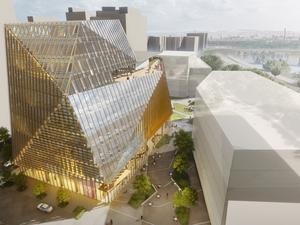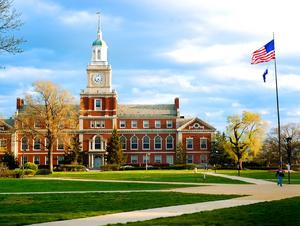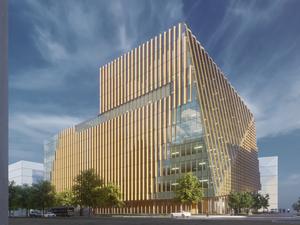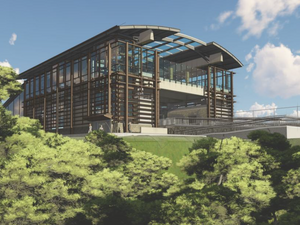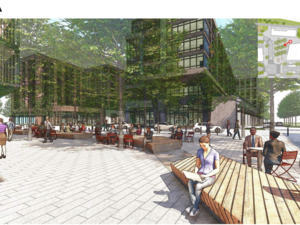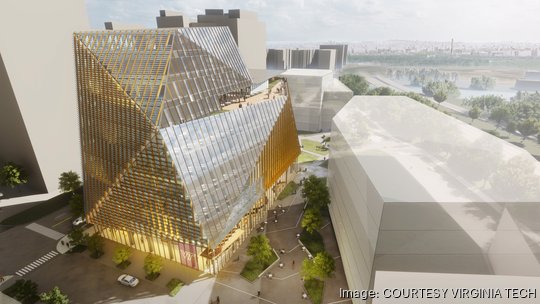
For roughly a year and half, executives at some of the largest firms in the D.C. area have had the ears of Virginia Tech officials who were laying the groundwork for what will be the school's $1 billion computer science-focused graduate campus.
Now, the university said Monday it is officially naming some of those CEOs as members of its first advisory board, a group that will continue to shape what the so-called “Innovation Campus” becomes.
The regional leaders — who hail from Boeing Co. (NYSE: BA), The Carlyle Group LP (NASDAQ: CG), Qualcomm Inc. (NASDAQ: QCOMM), Northrop Grumman Corp. (NYSE: NOC), Carbon, KPMG, Wellcome Leap, Hunch Analytics and the Greater Washington Partnership, itself a collection of high-level CEOs across the region — will now meet with university officials on a regular basis to discuss many of the campus’ facets, including its academic programing, said Lance Collins, executive director of Tech's new campus.
“It’s an innovation campus. We want to live up to the name,” he said. “We want to think about how we are approaching the instruction for our students, design the degrees with strong ties to industry. And we also want to think about the research activities on campus.”
Virginia Tech has always said companies would take a sizable amount of space within the physical campus, which is planned for 67 acres in the northernmost portion of Alexandria’s Potomac Yard. Programming should connect students to the companies that develop future technologies, which is why this advisory group will play such a prominent role, said Collins, who started at Virginia Tech in August after serving as Cornell University's dean of engineering.
“These are people who really have an incredible compass to where technology is going, and they are extraordinarily well-networked,” he said. “I want to take advantage of the industry strengths that are in the region.”
Amazon.com Inc. (NASDAQ: AMZN) — which is building millions of square feet of office in nearby Arlington and whose HQ2 hunt spurred the state to provide $250 million in funding for the Virginia Tech campus — isn’t currently a member of the group. But the university and company have reached out to each other on several occasions to talk about what Amazon Web Service's presence on the campus could look like.
The advisory group came into existence in a less formal manner shortly after the Amazon announcement, and it includes local business leaders with whom the university consulted on the hiring of Collins, said Sanju Bansal, advisory board chairman and CEO of Hunch Analytics, a health data firm based in Arlington. Most members have been advising the university in some capacity for a year now, largely acting behind the scenes.
But Bansal said he's been far more public about the region's need for some kind of computer science campus, relaying that to anyone who would listen for almost five years. And while many agreed, he said, it really wasn’t until the state’s pitch to host Amazon's second headquarters that the ball really got rolling.
So, when the university asked Bansal to take on the role as chairman, he said his response was simple: “Of course, I’ve wanted to do this before this was even a thing.”
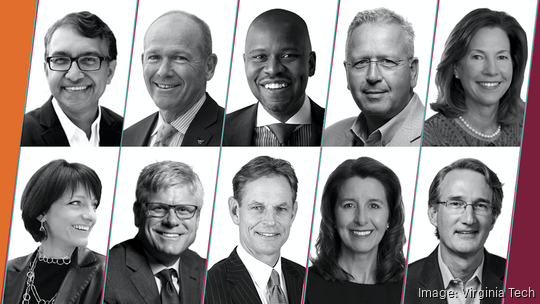
Here’s the full list of campus advisory board members, pictured above from left in the top row:
- Sanju Bansal, founder and CEO of Hunch Analytics
- Dave Calhoun, president and CEO of Boeing
- Ted Colbert, executive vice president of Boeing
- Joe DeSimone, executive chairman and co-founder of Carbon
- Lynne Doughtie, former chairman and CEO of KPMG
In the bottom row, from left is:
- Regina Dugan, CEO of Wellcome Leap
- Steve Mollenkopf, CEO of Qualcomm
- Russ Ramsey, board chair of the Greater Washington Partnership
- Kathy Warden, CEO of Northrop Grumman
- Glenn Youngkin, co-CEO of The Carlyle Group
“This is a blockbuster council,” said Ramsey, CEO of Ramsey Asset Management. “Hats off to Virginia Tech for attracting the CEOs of these companies.”
The VT campus opened to its first 79 graduate students in August. While the school is developing 5,000 square feet of startup space inside the National Industries for the Blind, all classes are being held remotely due to pandemic.
The university is also quickly approaching approval for its first flagship structure, a 300,000-square-foot academic building designed by SmithGroup. When fully launched, the campus will graduate some 750 graduate and doctorate degree students in computer science.
